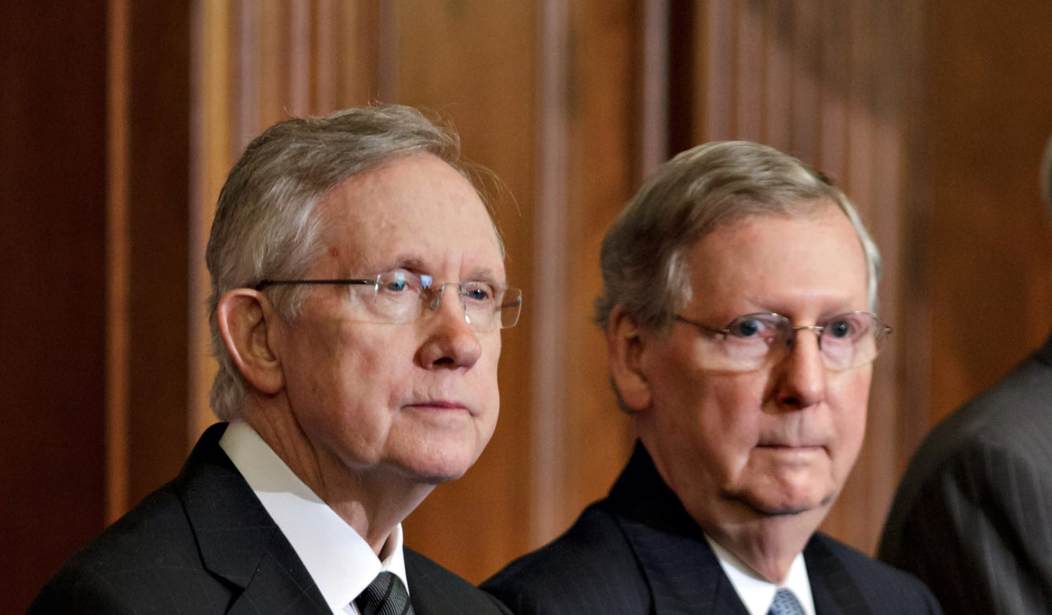WASHINGTON – Senate Republicans foiled Democratic efforts to consider legislation aimed at assuring that women receive compensation at work equal to their male counterparts — an issue now almost sure to rise during the fall election campaign.
In a 53-44 vote, with 60 votes needed to proceed, GOP lawmakers stood in the way of Democratic plans to debate and consider the Paycheck Fairness Act, a measure that would require employers to pay men and women with similar qualifications the same wages for similar jobs. It would also allow women to file suit for punitive damages in discrimination cases and bar employers from forbidding employees to discuss their salaries among themselves.
Every Republican opposed consideration along with Sen. Angus King (I-Maine), who usually sides with Democrats. Senate Democratic Leader Harry Reid, of Nevada, also voted no but did so only for parliamentary reasons that allow him to bring up the bill later.
The vote marked the third time since 2010 that supporters of the bill sponsored by Sen. Barbara Mikulski (D-Md.) proved unable to move it through. Democrats entered the vote knowing they didn’t have sufficient backing but pushed ahead hoping the result will further erode Republican support among women voters, a voting bloc that in recent years has been problematic for the GOP.
A recent survey sponsored by the Women’s Voices Women Vote Action Fund and Democracy Corps found that the pay equity issue could play to the benefit of Democrats in the midterm elections. When asked to respond to the statement, “Women succeed with pay equity and equal health insurance,” 65 percent of likely women voters questioned responded favorably. More significantly, 82 percent of unmarried women – a major Democratic bloc – expressed agreement.
Census data indicates women earn 77 cents for every dollar earned by men, according to the White House. But a Pew Research Center survey drew a slightly different conclusion – women earn 84 percent of what men receive. Younger women are doing even better, drawing salaries equal to 93 percent of men.
The vote came the day after what supporters termed Equal Pay Day – the number of days a woman has to work beyond the end of a year to earn the same amount of money a man earns by the end of the year. President Obama, who supported the measure, added his voice on Tuesday, signing a pair of executive orders prohibiting federal contractors from punishing workers who discuss their compensation with co-workers and requiring employers to submit information that breaks down pay scales along gender and race lines.
Republicans responded by accusing Democrats of hypocrisy, noting that a substantial pay gap exists in the White House – women earn 89 percent of what men earn at 1600 Pennsylvania Avenue – and within the offices of Democratic senators up for reelection in 2014.
Mikulski noted that the 77-cent pay gap figure represents an 18-cent improvement over what women earned 50 years ago, a modest increase she characterized as “pretty unjust, even un-American.”
“I don’t think we’ve come a long way with an 18-cent improvement over a 50-year period,” Mikulski said. “Give American woman not just a raised but what justice demands. We want to end that discrimination. No discrimination, no loopholes, no veil of secrecy.”
Sen. Elizabeth Warren (D-Mass.) asserted that the effects of pay discrimination are “real and they are long lasting.”
“America’s women are tired of hearing that pay inequality is not real,” Warren said. “We are tired of hearing that somehow it is our fault. We are ready to fight back against pay discrimination.”
Sen. Kirsten Gillibrand (D-N.Y.) argued that the pay gap “holds back entire families — it holds back the entire American economy.”
“Today women make up more than half of America’s population and nearly half the workforce,” Gillibrand said. “Women are out-earning men in college degrees and advanced degrees and a growing share of primary household earners. But to this day men are still out-earning women for the exact same work.”
Gillibrand maintained it’s nearly impossible for two-income families and sole female-breadwinning households to get ahead “when they are shortchanged every single month.”
“If we want a growing economy and a thriving middle class, pay women fairly,” she said. “It is that simple. When women earn equal pay, America’s GDP could grow by up to 4 percent. It is common sense, and it is the right thing to do to strengthen our economy and to strengthen our families.”
Republicans countered that measure would prove bad for business during difficult economic times and that outside factors often affect salary differences – some women take time off from work to raise children and return only after other co-workers have moved ahead. They also maintained that Reid refused to permit consideration of alternate ways to address the issue.
Senate Republican Leader Mitch McConnell, of Kentucky, along with Sen. Kelly Ayotte (R-N.H.), offered an amendment that would allow workers to “better balance the demands of work and family” by allowing them time off in lieu of overtime compensation. Reid refused to permit consideration.
“Senate Democrats want to control this debate from start to finish — and basically do nothing to help with our efforts to expand opportunity and jobs for women and men,” McConnell said. “It would appear, as some have put it, that they have no interest in solutions or any concern for the consequences of their actions.”
Sen. John Thune (R-S.D.) noted that the financial condition of women generally has eroded during Obama’s time in office.
“It is time this body recognizes that the policies the other side is advancing are not achieving the outcomes they claim will occur,” Thune said. “We need to renew our commitment to helping all Americans, including women, find job opportunities that allow them to achieve the American dream. We need to return this country to a place where America truly is another name for opportunity.”
Sen. Deb Fischer (R-Neb.) agreed that gender-based pay discrimination is “unacceptable” but she added that Republicans differ with Democrats over how to best address the issue.
“We believe the reports prepared for the U.S. Department of Labor recognize that commonly used wage gap statistics don’t tell the full story,” she said. “Factors including differences in occupation, education, fields of study, type of work, hours worked, and other personal choices shape career paths and they shape earning potential. Moreover, salaries alone don’t account for total compensation.”
Regardless, some women continue to struggle with gender-based pay discrimination, Fischer acknowledged, directly impacting a woman’s livelihood, financial future and her job security.
“With 60 percent of women working as the primary breadwinners, lost wages detrimentally impact families as well as single women,” she said.
But the Democratic solution she said, is little more than a political ploy that will result in a greater number of lawsuits.
“More government and more lawyers will not lead to more pay for women,” Fischer said.









Join the conversation as a VIP Member